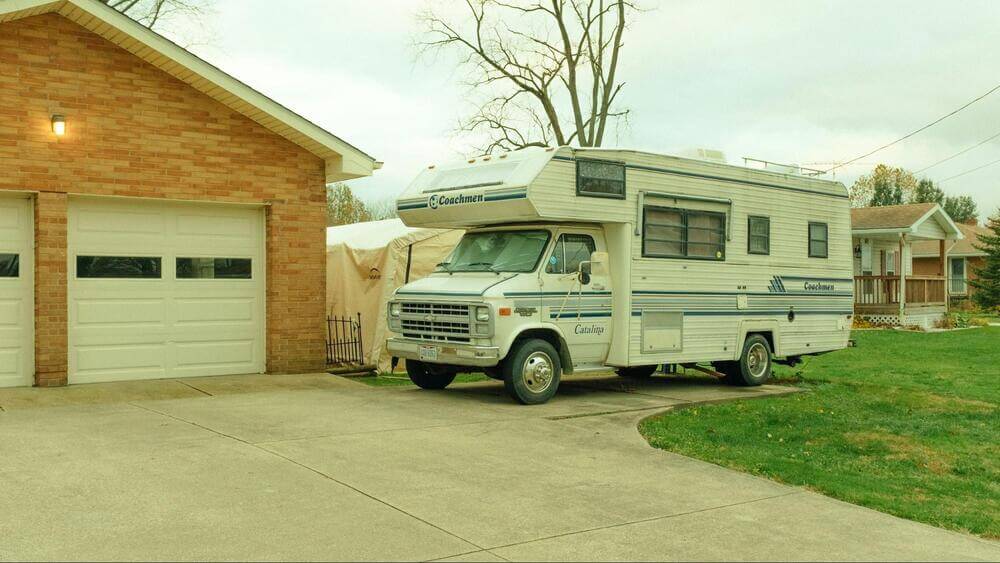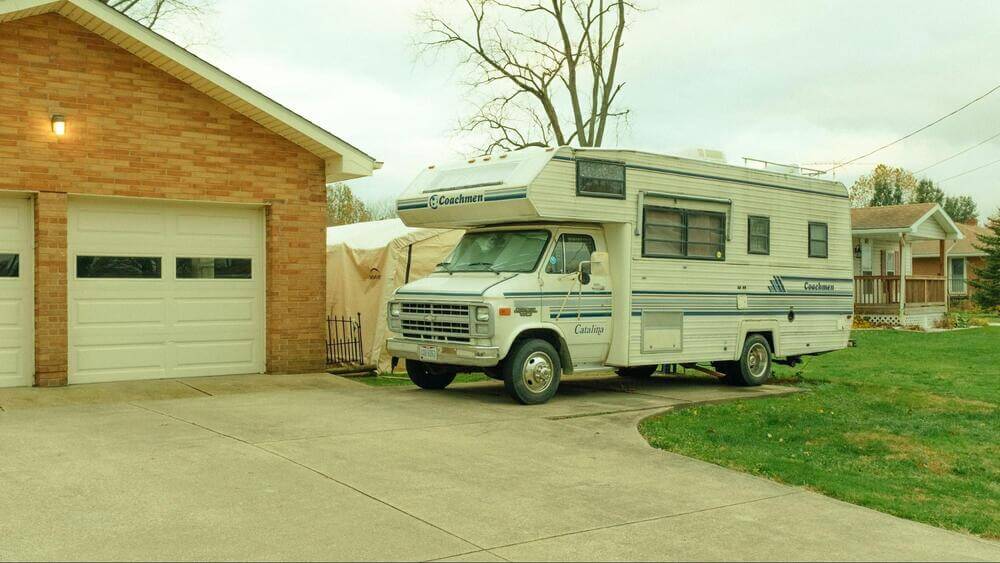 Image courtesy of Keagan Henman @ Unsplash.com
Image courtesy of Keagan Henman @ Unsplash.com
Don't Be That Guy With the Bungee Cords
You take pride in cleaning, maintaining, and protecting your RV or camper. Otherwise, you wouldn't be reading this in the first place, right?
Some guys are satisfied with parking their rigs in the driveway and calling it a day.
But we know you wouldn't be able to sit back, crack a cold one, or enjoy the rest of your day unless you knew your RV was properly put away.
As you know, putting her away properly means using a good set of RV tire covers, which are a classic accessory for your rig.
Now, tire covers aren't just about tire protection...
Choosing a good set of RV tire covers ensures your road wagon looks nice, even when it's put away.
So in the following guide, we're exploring how to choose good-quality RV tire covers. And why you shouldn't cheap out and wrap them in tarps and bungee cords like that guy who lives up the street from you.
Let's get into it!
Why Choosing the Right Cover Matters
Ultimately, the right tire covers will protect your RV's wheels and rims from harsh weather conditions, like sun, rain, snow, and ice.
And they'll do it a lot better than low-quality RV tire covers.
So sure, you could buy cheap tire covers... You could even use an old tarp and some bungee cords to wrap your wheels and get them out of the sun.
It would get the job done...
But would it look nice? Would it guarantee your wheels are protected? Would you be able to sit down at the end of the day, crack a beer, and take pride in your RV?
That's what we thought...
The thing is that high-quality RV tire covers ARE BETTER... They look better, they protect better, and they ensure that your road wagon is in its best shape at all times.
Don't forget! You can also check out our comprehensive tire cover guide, where we take you through virtually everything there is to know about tire covers. We explain what they are, what to look for when shopping for tire covers, and how you can make sure you buy the right size tire covers for your car or RV.

How To Pick The Right Size For RV Tire Covers
Every RV owner knows that tire covers are a lot like Goldilocks and her bowl of porridge. Too tight, and your covers are prone to ripping, cracking, and wearing out…
And too loose covers just won't properly protect your tires. They'll flap in the wind, and they're just going to look sloppy to boot!
You want snug fitting. Not too tight and not too loose.
But to get that secure fit, you'll need to roll up your sleeves, pull out your tape measure, crawl underneath your rig, and measure your tires' width.
We already have a step-by-step guide to help you do exactly that: How to measure for RV tire covers.
But before you get to measuring, the easiest way to know what size covers you'll need is to check the tires themselves.
Look on the tire's sidewall for the size, aspect ratio, and diameter, which will be written in a "225/75R15" format.
However, if you have older tires and the numbers are worn out, you might need to measure manually.
So here's a quick rundown of how to pick the right size:
-
Make sure your tires are properly inflated
-
Measure the height, from the ground to the very top of the tread.
-
Measure the tire's width, from tread to tread.
-
Write it down so you don't forget.
-
Then, punch your finding into our nifty Tire Diameter Calculator
It’s not hard to understand why you need to select the proper size tire covers for your rig.
But aside from choosing the right size, it’s also important to choose covers that have straps or weather locks on them, which also keep them snug-fitting and secure, even in the windiest conditions.
That size, size isn’t the only factor you’ll want to keep in mind! The material you choose for your tire covers will also play a major role in how they look, and how long they’ll last.
Let’s take a better look below!

Image courtesy of Teanna Morgan @ Unsplash.com
What Materials Are Best for RV Tire Covers?
If you've been looking around for RV tire covers, you've likely noticed that they come in a wide range of different materials.
This is great for giving you a lot of options to choose from. But it makes choosing the right set more complicated than it has to be.
Ultimately, you want tire covers that can withstand harsh conditions (cold and heat), and that aren't susceptible to premature wear.
So on that note, let's take a look at just some of the cover materials you might see out there, and the pros and cons of each.
-
Cotton or Canvas - Soft but they absorb water, fade fast, and tear easily.
-
Non-Woven Fabric - Lightweight, okay for short-term sun, but not waterproof or long-lasting.
-
Cheap Thin Vinyl - Thin, cracks quickly, and becomes brittle in heat or cold.
-
Regular Heavy-Duty Vinyl - Much stronger than cheaper vinyl covers. But they’ll still only last 1 or 2 years tops due to UV damage, moisture, and basic wear and tear.
-
Basic Polyester - Slightly better durability, but still breaks down with sun exposure.
-
Multi-layer Vinyl and Fabric - Designed with UV protection, waterproofing, and elastic materials, designed for a snug fit that truly protects your tires from all the elements.
So there you have it! You’ll find plenty of tire covers on the market designed with different materials. But only the high-quality, multi-layer covers will stand up to the test of time.
Of course, you can save yourself some money by buying cheap RV tire covers.
Just remember, though, that good tire covers aren’t cheap, and cheap tire covers, well, they ain’t good!

Essential Features to Look For in High-Quality Covers
Dad always said that buying cheap tools was a lot like bringing a knife to a gunfight... Sure, a knife is still a weapon, but you're going to feel pretty ridiculous when the bullets start flying.
Well, the same thing goes for RV tire covers.
Cheap covers ARE still covers. But you'll probably regret buying them when they don't fit right, the seams start ripping, and the material starts cracking from being out in the sun too long. Cheap covers simply become a headache.
So here's a quick list of the best materials to look for when shopping for a good set of RV tire covers.
-
Elasticized covers ensure a snug fit, but you don't want them to be too stretchy. Namely, you want solid covers that have elastic straps to help keep them in place.
-
Adjustable buckle systems (StormLock System) for wind resistance
-
Reinforced stitching to prevent ripping
-
UV-treated surfaces for long-term sun exposure
-
Waterproof layers to block rain and snow
-
Scratch-resistant lining to protect your rims
Just remember that not all RV tire covers are built the same.
Sure, many similar products have elastic hems and waterproofing...
But that doesn't mean they're designed to be rugged or to stand up to the test of time.
And we know you need an elite solution to keep your rig looking its best!
How TireShield Pro Covers Solve All These Problems
TOOL TROOPERS TireShield Pro tire covers are THE solution you've been looking for.
Our ultra-durable covers are designed for a rugged and universal fit. So whether you're putting them on a car, truck, camper, or RV, you're in good hands!
Our multi-layer covers are designed specifically for rain and snow protection, and UV-resistance to keep your rims looking their best at all times.
Let's take a look at what else our TireShield Pro covers have to offer:
-
The Stormlock system to help keep your covers in place
-
Cotton thread, soft inner liner to protect your rims from scuffs and scratches
-
Durable UV-resistant vinyl outer layer to protect from sun damage
-
Special UV Protection Coating to protect your tires from any UV harm
-
Reinforced stitching to make ensure it can handle not just one, but multiple hurricanes
-
Snazzy storage pouch for safe keeping while on the road
And the best part? The Elastic Grip, designed for easy installation on virtually any vehicle, providing a snug fit, every time!
Check them out, here: Tool Troopers Tireshield Pro.

How To Convince Your Partner To Invest In
By now, you should have a good understanding of why you should dish a bit of hard-earned cash for a quality set of covers. But explaining it to your significant other... That can be a bit tricky!
But don't worry, my friend! We've got you!
Ultimately, you can tell them that buying good-quality RV tire covers is an investment that will SAVE you money in the long run, making sure that your tires last longer, and look better while they're still rolling down the pavement.
Need help explaining why covering tires is a smart investment, especially for long-term storage?
Here are a few tips that can help you out!
-
Show them the cost of replacing a worn-out set of RV tires ($$$)
-
Man-splain how UV damage can cause dry rot
-
Show them what an RV tire blowout looks like
-
List safety facts about accidents caused by tire blowouts
-
Show 'em how others in the RV community care for their rigs
-
Buy a set before they even know...
Just kidding with that last one...
But the fact is that a good set of covers keeps your tires in top shape, especially when your rolling fortress is parked for long periods.
With good tire covers, your rig is sure to be ready to hit the road the minute your family decides it's time for your next road trip.
Frequently Asked Questions - Choosing The Right RV Tire Covers
Now, just in case we've missed anything, let's review a handful of frequently asked questions relating to RV tire covers and how to choose the right ones to protect your rig.
What should I look for when choosing RV tire covers?
A proper size for your rig, made from quality materials, durable construction with reinforced stitching, elastic hems for that perfect fit, a UV-treated layer, and waterproofing. These are all of the essential components of a good, high-quality set of tire covers.
How do I know what size RV tire cover I need?
The simplest way is to check your tires for their size, diameter, and aspect ratio. However, if you're dealing with older tires and the numbers are worn out, you might need to manually measure your tire's height and width to make sure you buy the right size. Check out our handy Tire Diameter Calculator if you need a hand!
Are multi-layer tire covers better than vinyl covers?
Yes! Vinyl is a good, sturdy material. But you need a product that keeps moisture out, won't rip or tear, won't fall apart in the sun, and that's going to provide a tight fit year after year. Vinyl might be waterproof. But vinyl alone is not designed for the rugged, durable, year-after-year use you need.
Should I choose light or dark-colored RV tire covers?
Lighter-colored tire covers are generally better because they won't absorb as much heat from the sun. However, if your RV tire covers are built with a rugged UV-resistance layer, they'll be designed for this and it won't really matter anyway.
Is it better to cover each dual tire separately or together?
It depends on the product you're using. You might find some tire covers that are designed specifically for covering dual tires. But most of the time, tire covers are meant to cover a single tire. So don't waste your time stretching one out, trying to cover two tires. It's just ain't worth it!
Where can I buy RV Tire Covers?
You can find plenty of retailers online that stock and sell RV tire covers. Walmart, Costco, and other big-name stores usually carry them. But you can also check out our store and learn why Tool Troopers' TireShield PRO covers are THE best option for your RV.




